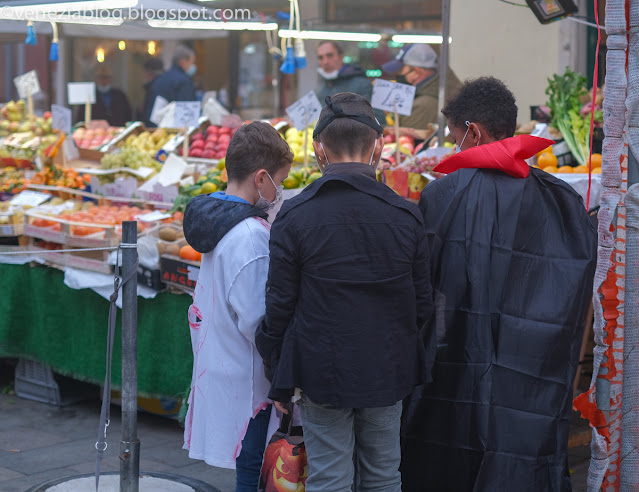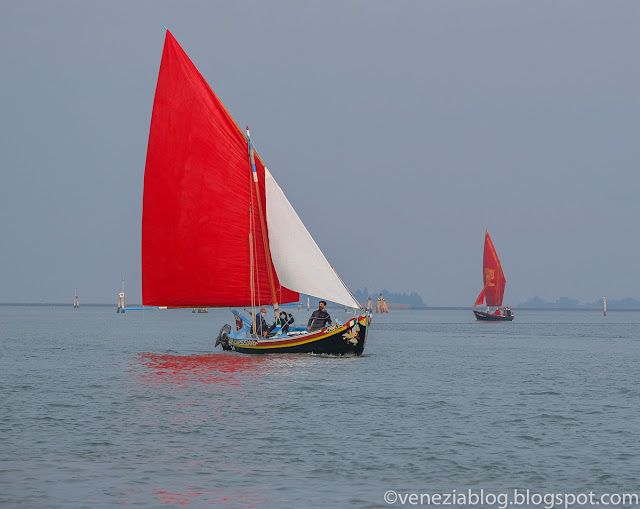Saturday, October 31, 2020
Wednesday, October 28, 2020
Tuesday, October 27, 2020
Rigged Out with Canvases, But Not in the Form of Sails
Thursday, October 22, 2020
Tuesday, October 20, 2020
Saturday, October 17, 2020
A Mermaid on the Grand Canal, This Morning
In the weeks after the Covid-19 lock-down first went into effect last March, there were a series of reports about how with the abeyance of water traffic the canals of the historic center had become pellucid and still as reflecting pools. Nature had returned: you now saw schools of fish instead of herds of mass tourists; egrets and cormorants replaced mototopi and taxis; a prolific pair of Common Sheldrakes could leisurely lead their ducklings down the length of the Grand Canal, and there were even sightings of dolphins!
Though this last claim was not intended to be taken seriously.
(Though a native Venetian fireman told me nine years ago that he had in fact seen dolphins in the lagoon, but in each instance they were dead.)
So why not a mermaid? I thought this morning, upon seeing the sight above.
Who else would stretch out nearly nude on the cold slimy stones of Ca' D'Oro on a brisk autumn morning?
I suppose the absence of a fishtail, and the presence of stiletto heels, were clear indications this was not some rare mythical creature from the ocean deep but just a kind of person--a model--spotted far more often in the city center than the Common Sheldrake (which I'd previously only ever seen out near Torcello).
And the appearance of mermaids and/or mermen in the Grand Canal wouldn't necessarily be all that positive a development, as they'd likely just encourage more tourists to dive from bridges and go for swims.
So I guess I'll stick to looking out for those magical creatures once abundant in the lagoon but now rarely seen, like the sea horses John Ruskin refers to in a letter written in May of 1857 to his friend Charles Eliot Norton, recommending that Norton put "two or three cavalli di mare in a basin in your room [to] see them swim. But don't keep them more than a day, or they die, put them into the canal again." My son discovered one among the sea weed on a mooring pole at Certosa, but I've never seen one in the city.
 | ||||||
| This model didn't have to lie down in cold water, but I doubt her draping provided much warmth |
 |
| No fewer than four different poses to choose from |
Wednesday, October 14, 2020
From Blog Post to Book (And Now Available for Pre-Order!)
 | ||
| The final jacket proof of Ciao, Sandro!, by Steven Varni and Luciano Lozano |
Every
native Venetian knows there’s far more to their famously beautiful city
than meets the eye, but none better than a keen-eared, sharp-scenting
little dog named Sandro, who leads us all around his maze-like hometown--and even out to Murano--on a top-secret mission.
This, in a nutshell, is the story of a new children's picture book I've written and Luciano Lozano has beautifully illustrated that will be published by Abrams Books for the North America market on June 8, 2021.
The book's been a long time in the works, five years to be exact, and the eponymous protagonist on the jacket cover above may look familiar to some of you, as he's modeled on an actual gondolier's dog I first wrote about on December 21, 2015 who knew how to take the vaporetti all around the lagoon--from the Venice's historic center to Giudecca and Lido--all by himself.
That post was entitled "Venice's Greatest Explorer Is Four-legged" (from which you can see an image below). And about a month later I salvaged what I could from some research video I shot of Sandro and combined it with the audio of an interview I did with his gondolier companion Nicola (in preparation for writing the first post) and put up a two minute video (with English subtitles) in which Nicola recounts the first time the captain of a vaporetto called him to tell him his little dog had come aboard by himself: "A Dog About Town."
 |
I was happy to leave all questions of exactly how to illustrate the book entirely up to him. My editor at Abrams had seen the blog posts that inspired the book, but whether she in turn would show them (with their images of the real-world Sandro) to Luciano was entirely up to her. My text described the dog only as being small, beyond that he could look however Luciano thought it best for him to look. In fact, I wouldn't have minded if the male dog of my original text had become female. I was looking forward to being surprised, and based upon what I'd seen of Luciano's work and of the people at Abrams, I had no fear that the surprises would be of an unpleasant sort.
My job was done, and I hoped that the text already contained a certain subtext I only became aware of in its writing: which was a story of how, in a world overwhelmed by visual images, and in a city famous for its celebrated sights, we make our way in the world and know our place in it with the use of all of our senses.
For Venice is not just a famous collection of stage-sets for selfies--though it is that--but a city with its own distinctive sounds and smells and textures and tastes. From my observation small children in Venice, just like small dogs, are well aware of what seems like it should be quite obvious, but it's an awareness that can diminish as one grows up.
So, really, Ciao, Sandro! is not just about the Venice of the five senses, but perhaps might serve as a reminder in this image-driven age of ours that all of our hometowns, no matter how celebrated or obscure, have their own distinctive sensory experiences.





















